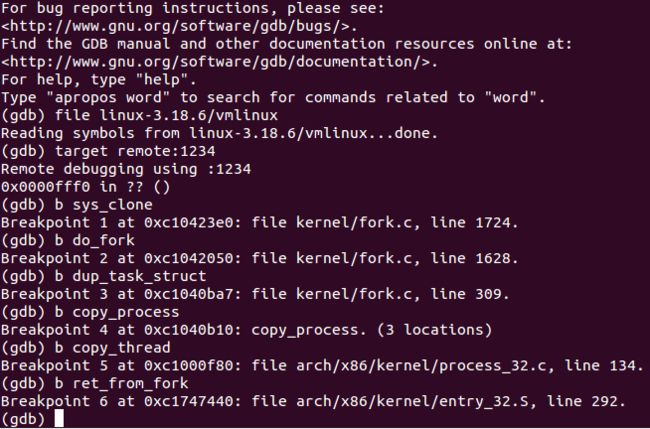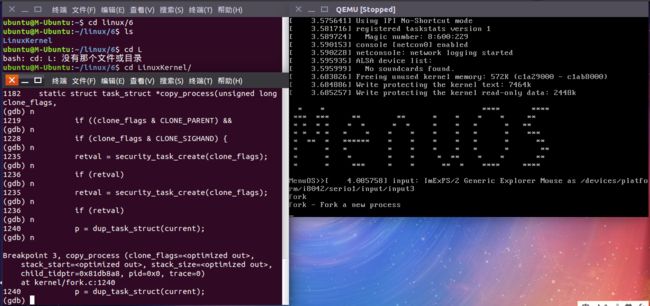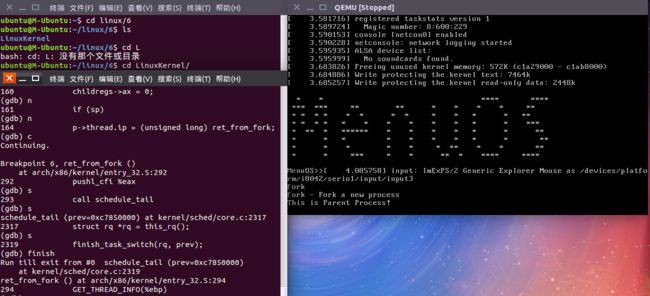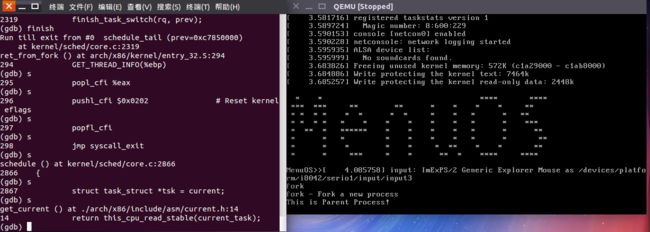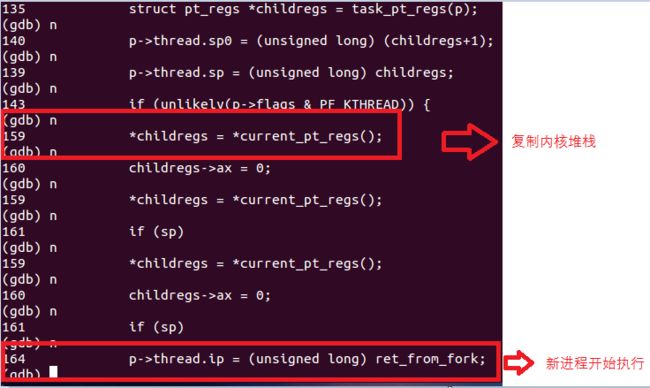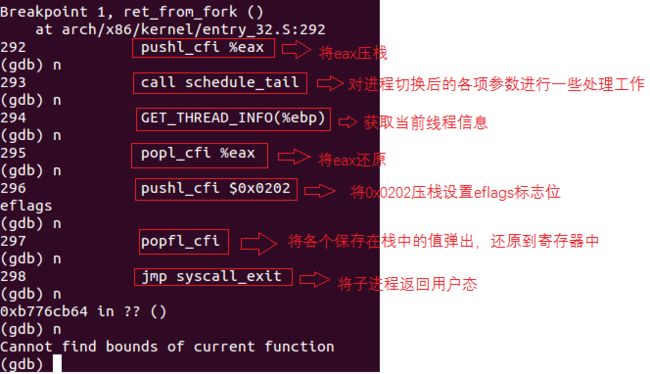实验截图
设置断点。
跟踪到copy_process函数。
跟踪到ret_from_fork()。
跟踪ret_from_fork()的汇编代码。
task_struct数据结构分析
struct task_struct {
volatile long state;//进程运行状态。-1为等待状态,0为运行,>0为停止状态
void *stack; //进程的内核堆栈
atomic_t usage;
unsigned int flags; //每个进程的标识符
unsigned int ptrace;//进程跟踪标识符
#ifdef CONFIG_SMP //条件编译,即对处理时用到的代码
struct llist_node wake_entry;
int on_cpu;
struct task_struct *last_wakee;
unsigned long wakee_flips;
unsigned long wakee_flip_decay_ts;
int wake_cpu;
#endif
/*运行队列和进程调度相关的代码*/
int on_rq;
int prio, static_prio, normal_prio;
unsigned int rt_priority;
const struct sched_class *sched_class;
struct sched_entity se;
struct sched_rt_entity rt;
#ifdef CONFIG_CGROUP_SCHED
struct task_group *sched_task_group;
#endif
struct sched_dl_entity dl;
#ifdef CONFIG_PREEMPT_NOTIFIERS
/* list of struct preempt_notifier: */
struct hlist_head preempt_notifiers;
#endif
#ifdef CONFIG_BLK_DEV_IO_TRACE
unsigned int btrace_seq;
#endif
unsigned int policy;
int nr_cpus_allowed;
cpumask_t cpus_allowed;
#ifdef CONFIG_PREEMPT_RCU
int rcu_read_lock_nesting;
union rcu_special rcu_read_unlock_special;
struct list_head rcu_node_entry;
#endif /* #ifdef CONFIG_PREEMPT_RCU */
#ifdef CONFIG_TREE_PREEMPT_RCU
struct rcu_node *rcu_blocked_node;
#endif /* #ifdef CONFIG_TREE_PREEMPT_RCU */
#ifdef CONFIG_TASKS_RCU
unsigned long rcu_tasks_nvcsw;
bool rcu_tasks_holdout;
struct list_head rcu_tasks_holdout_list;
int rcu_tasks_idle_cpu;
#endif /* #ifdef CONFIG_TASKS_RCU */
#if defined(CONFIG_SCHEDSTATS) || defined(CONFIG_TASK_DELAY_ACCT)
struct sched_info sched_info;
#endif
struct list_head tasks; //进程的链表,将所有进程通过双向循环链表链接在一起。
#ifdef CONFIG_SMP
struct plist_node pushable_tasks;
struct rb_node pushable_dl_tasks;
#endif
struct mm_struct *mm, *active_mm; //与进程的地址空间相关的数据结构
#ifdef CONFIG_COMPAT_BRK
unsigned brk_randomized:1;
#endif
/* per-thread vma caching */
u32 vmacache_seqnum;
struct vm_area_struct *vmacache[VMACACHE_SIZE];
#if defined(SPLIT_RSS_COUNTING)
struct task_rss_stat rss_stat;
#endif
/* task state */
int exit_state;
int exit_code, exit_signal;
int pdeath_signal; /* The signal sent when the parent dies */
unsigned int jobctl; /* JOBCTL_*, siglock protected */
/* Used for emulating ABI behavior of previous Linux versions */
unsigned int personality;
unsigned in_execve:1; /* Tell the LSMs that the process is doing an
* execve */
unsigned in_iowait:1;
/* Revert to default priority/policy when forking */
unsigned sched_reset_on_fork:1;
unsigned sched_contributes_to_load:1;
unsigned long atomic_flags; /* Flags needing atomic access. */
pid_t pid; //进程标识符
pid_t tgid; //进程标识符
#ifdef CONFIG_CC_STACKPROTECTOR
/* Canary value for the -fstack-protector gcc feature */
unsigned long stack_canary;
#endif
/*
* pointers to (original) parent process, youngest child, younger sibling,
* older sibling, respectively. (p->father can be replaced with
* p->real_parent->pid)
*/
/*与进程父子关系有关的代码*/
struct task_struct __rcu *real_parent; /* real parent process */
struct task_struct __rcu *parent; /* recipient of SIGCHLD, wait4() reports */
/*
* children/sibling forms the list of my natural children
*/
struct list_head children; /* list of my children */
struct list_head sibling; /* linkage in my parent's children list */
struct task_struct *group_leader; /* threadgroup leader */
/*
* ptraced is the list of tasks this task is using ptrace on.
* This includes both natural children and PTRACE_ATTACH targets.
* p->ptrace_entry is p's link on the p->parent->ptraced list.
*/
struct list_head ptraced;
struct list_head ptrace_entry;
/* PID/PID hash table linkage. */
struct pid_link pids[PIDTYPE_MAX];
struct list_head thread_group;
struct list_head thread_node;
struct completion *vfork_done; /* for vfork() */
int __user *set_child_tid; /* CLONE_CHILD_SETTID */
int __user *clear_child_tid; /* CLONE_CHILD_CLEARTID */
/*与时间相关的代码*/
cputime_t utime, stime, utimescaled, stimescaled;
cputime_t gtime;
#ifndef CONFIG_VIRT_CPU_ACCOUNTING_NATIVE
struct cputime prev_cputime;
#endif
#ifdef CONFIG_VIRT_CPU_ACCOUNTING_GEN
seqlock_t vtime_seqlock;
unsigned long long vtime_snap;
enum {
VTIME_SLEEPING = 0,
VTIME_USER,
VTIME_SYS,
} vtime_snap_whence;
#endif
unsigned long nvcsw, nivcsw; /* context switch counts */
u64 start_time; /* monotonic time in nsec */
u64 real_start_time; /* boot based time in nsec */
/* mm fault and swap info: this can arguably be seen as either mm-specific or thread-specific */
unsigned long min_flt, maj_flt;
struct task_cputime cputime_expires;
struct list_head cpu_timers[3];
/* process credentials */
const struct cred __rcu *real_cred; /* objective and real subjective task
* credentials (COW) */
const struct cred __rcu *cred; /* effective (overridable) subjective task
* credentials (COW) */
char comm[TASK_COMM_LEN]; /* executable name excluding path
- access with [gs]et_task_comm (which lock
it with task_lock())
- initialized normally by setup_new_exec */
/* file system info */
int link_count, total_link_count;
#ifdef CONFIG_SYSVIPC
/* ipc stuff */
struct sysv_sem sysvsem;
struct sysv_shm sysvshm;
#endif
#ifdef CONFIG_DETECT_HUNG_TASK
/* hung task detection */
unsigned long last_switch_count;
#endif
/* 与CPU有关的数据结构*/
struct thread_struct thread;
/* filesystem information */
struct fs_struct *fs;//与文件系统有关的数据结构
/* open file information */
struct files_struct *files; //文件描述符
/* namespaces */
struct nsproxy *nsproxy;
/* 与信号处理相关的数据结构 */
struct signal_struct *signal;
struct sighand_struct *sighand;
sigset_t blocked, real_blocked;
sigset_t saved_sigmask; /* restored if set_restore_sigmask() was used */
struct sigpending pending;
unsigned long sas_ss_sp;
size_t sas_ss_size;
int (*notifier)(void *priv);
void *notifier_data;
sigset_t *notifier_mask;
struct callback_head *task_works;
struct audit_context *audit_context;
#ifdef CONFIG_AUDITSYSCALL
kuid_t loginuid;
unsigned int sessionid;
#endif
struct seccomp seccomp;
/* Thread group tracking */
u32 parent_exec_id;
u32 self_exec_id;
/* Protection of (de-)allocation: mm, files, fs, tty, keyrings, mems_allowed,
* mempolicy */
spinlock_t alloc_lock;
/* Protection of the PI data structures: */
raw_spinlock_t pi_lock;
#ifdef CONFIG_RT_MUTEXES //互斥锁
/* PI waiters blocked on a rt_mutex held by this task */
struct rb_root pi_waiters;
struct rb_node *pi_waiters_leftmost;
/* Deadlock detection and priority inheritance handling */
struct rt_mutex_waiter *pi_blocked_on;
#endif
#ifdef CONFIG_DEBUG_MUTEXES//互斥锁
/* mutex deadlock detection */
struct mutex_waiter *blocked_on;
#endif
#ifdef CONFIG_TRACE_IRQFLAGS //与调试相关的数据结构
unsigned int irq_events;
unsigned long hardirq_enable_ip;
unsigned long hardirq_disable_ip;
unsigned int hardirq_enable_event;
unsigned int hardirq_disable_event;
int hardirqs_enabled;
int hardirq_context;
unsigned long softirq_disable_ip;
unsigned long softirq_enable_ip;
unsigned int softirq_disable_event;
unsigned int softirq_enable_event;
int softirqs_enabled;
int softirq_context;
#endif
#ifdef CONFIG_LOCKDEP
# define MAX_LOCK_DEPTH 48UL
u64 curr_chain_key;
int lockdep_depth;
unsigned int lockdep_recursion;
struct held_lock held_locks[MAX_LOCK_DEPTH];
gfp_t lockdep_reclaim_gfp;
#endif
/* journalling filesystem info */
void *journal_info;
/* stacked block device info */
struct bio_list *bio_list;
#ifdef CONFIG_BLOCK
/* stack plugging */
struct blk_plug *plug;
#endif
/* VM state */
struct reclaim_state *reclaim_state;
struct backing_dev_info *backing_dev_info;
struct io_context *io_context;
unsigned long ptrace_message;
siginfo_t *last_siginfo; /* For ptrace use. */
struct task_io_accounting ioac;
#if defined(CONFIG_TASK_XACCT)
u64 acct_rss_mem1; /* accumulated rss usage */
u64 acct_vm_mem1; /* accumulated virtual memory usage */
cputime_t acct_timexpd; /* stime + utime since last update */
#endif
#ifdef CONFIG_CPUSETS
nodemask_t mems_allowed; /* Protected by alloc_lock */
seqcount_t mems_allowed_seq; /* Seqence no to catch updates */
int cpuset_mem_spread_rotor;
int cpuset_slab_spread_rotor;
#endif
#ifdef CONFIG_CGROUPS
/* Control Group info protected by css_set_lock */
struct css_set __rcu *cgroups;
/* cg_list protected by css_set_lock and tsk->alloc_lock */
struct list_head cg_list;
#endif
#ifdef CONFIG_FUTEX
struct robust_list_head __user *robust_list;
#ifdef CONFIG_COMPAT
struct compat_robust_list_head __user *compat_robust_list;
#endif
struct list_head pi_state_list;
struct futex_pi_state *pi_state_cache;
#endif
#ifdef CONFIG_PERF_EVENTS
struct perf_event_context *perf_event_ctxp[perf_nr_task_contexts];
struct mutex perf_event_mutex;
struct list_head perf_event_list;
#endif
#ifdef CONFIG_DEBUG_PREEMPT
unsigned long preempt_disable_ip;
#endif
#ifdef CONFIG_NUMA
struct mempolicy *mempolicy; /* Protected by alloc_lock */
short il_next;
short pref_node_fork;
#endif
#ifdef CONFIG_NUMA_BALANCING
int numa_scan_seq;
unsigned int numa_scan_period;
unsigned int numa_scan_period_max;
int numa_preferred_nid;
unsigned long numa_migrate_retry;
u64 node_stamp; /* migration stamp */
u64 last_task_numa_placement;
u64 last_sum_exec_runtime;
struct callback_head numa_work;
struct list_head numa_entry;
struct numa_group *numa_group;
/*
* Exponential decaying average of faults on a per-node basis.
* Scheduling placement decisions are made based on the these counts.
* The values remain static for the duration of a PTE scan
*/
unsigned long *numa_faults_memory;
unsigned long total_numa_faults;
/*
* numa_faults_buffer records faults per node during the current
* scan window. When the scan completes, the counts in
* numa_faults_memory decay and these values are copied.
*/
unsigned long *numa_faults_buffer_memory;
/*
* Track the nodes the process was running on when a NUMA hinting
* fault was incurred.
*/
unsigned long *numa_faults_cpu;
unsigned long *numa_faults_buffer_cpu;
/*
* numa_faults_locality tracks if faults recorded during the last
* scan window were remote/local. The task scan period is adapted
* based on the locality of the faults with different weights
* depending on whether they were shared or private faults
*/
unsigned long numa_faults_locality[2];
unsigned long numa_pages_migrated;
#endif /* CONFIG_NUMA_BALANCING */
struct rcu_head rcu;
/*
* 与管道相关的数据结构
*/
struct pipe_inode_info *splice_pipe;
struct page_frag task_frag;
#ifdef CONFIG_TASK_DELAY_ACCT
struct task_delay_info *delays;
#endif
#ifdef CONFIG_FAULT_INJECTION
int make_it_fail;
#endif
/*
* when (nr_dirtied >= nr_dirtied_pause), it's time to call
* balance_dirty_pages() for some dirty throttling pause
*/
int nr_dirtied;
int nr_dirtied_pause;
unsigned long dirty_paused_when; /* start of a write-and-pause period */
#ifdef CONFIG_LATENCYTOP
int latency_record_count;
struct latency_record latency_record[LT_SAVECOUNT];
#endif
/*
* time slack values; these are used to round up poll() and
* select() etc timeout values. These are in nanoseconds.
*/
unsigned long timer_slack_ns;
unsigned long default_timer_slack_ns;
#ifdef CONFIG_FUNCTION_GRAPH_TRACER
/* Index of current stored address in ret_stack */
int curr_ret_stack;
/* Stack of return addresses for return function tracing */
struct ftrace_ret_stack *ret_stack;
/* time stamp for last schedule */
unsigned long long ftrace_timestamp;
/*
* Number of functions that haven't been traced
* because of depth overrun.
*/
atomic_t trace_overrun;
/* Pause for the tracing */
atomic_t tracing_graph_pause;
#endif
#ifdef CONFIG_TRACING
/* state flags for use by tracers */
unsigned long trace;
/* bitmask and counter of trace recursion */
unsigned long trace_recursion;
#endif /* CONFIG_TRACING */
#ifdef CONFIG_MEMCG /* memcg uses this to do batch job */
unsigned int memcg_kmem_skip_account;
struct memcg_oom_info {
struct mem_cgroup *memcg;
gfp_t gfp_mask;
int order;
unsigned int may_oom:1;
} memcg_oom;
#endif
#ifdef CONFIG_UPROBES
struct uprobe_task *utask;
#endif
#if defined(CONFIG_BCACHE) || defined(CONFIG_BCACHE_MODULE)
unsigned int sequential_io;
unsigned int sequential_io_avg;
#endif
};
fork函数创建新进程过程分析
在Linux系统中fork()通过调用clone系统调用实现其功能,而clone()是通过调用do_fork()实现的。
do_fork()定义在kernel/fork.c文件中。 该函数调用copy_process()开始创建新进程。工作过程如下:
1.调用dup_task_struct()为新进程创建一个内核栈、thread_info结构和task_struct(PCB),这些值与当前进程的值相同。此时,子进程和父进程的描述符是完全相同的。
2.检查并确保新创建这个子进程后,当前用户所拥有的进程数目没有超出给它分配的资源的限制。
3.子进程着手使自己与父进程区别开来。进程描述符内的许多成员都要被清0或设为初始值。那些不是继承而来的进程描述符成员,主要是统计信息。task_struct中的大多数数据都依然未被修改。
4.子进程的状态被设置为TASK_UNINTERRUPTINLE,以保证它不会投入运行。(注:TASK_UNINTERRUPTIBLE使进程只能被wake_up()唤醒,即等待状态。等待状态不可被信号解除。)
5.copy_process()调用copy_flags()以更新task_struct的flags成员。表明进程是否拥有超级用户权限的PE_SUPERPRIV标志被清0。表明进程还没有调用exec()的函数的PF_FORKNOEXEC标志被设置。
6.调用alloc_pid()为新进程分配一个有效的PID。
7.根据传递给clone()的参数标志,copy_process()拷贝或共享打开文件、文件系统信息、信号处理函数、进程地址空间和命名空间等。在一般情况下,这些资源会被给定进程的所有线程共享;否则,这些资源对每个进程是不同的,因此被拷贝到这里。
8.最后,copy_process()做扫尾工作并返回一个指向子进程的指针。
回到do_fork函数,如果copy_process()函数成功返回,新创建的子进程被唤醒并让其投入运行。
子进程是从哪开始执行的?
当执行到
p->thread.ip = (unsigned long) ret_from_fork; //调度到子进程时的第一条指令地址。
时,即子进程得到CPU时它从这个位置开始执行的。
而执行这条语句
*childregs = *current_pt_regs(); //复制内核堆栈
保证了新进程的执行起点和内核堆栈的一致性。
如下图gdb跟踪所示。
新进程执行起点对应的堆栈状态分析
gdb调试分析
总结
Linux创建一个新进程的过程:系统通过sys_fork、sys_clone、sys_vfork三个系统调用中的任意一个创建新进程,这三个系统调用都调用do_fork()函数,由do_fork()函数调用其它函数复制父进程的PCB,创建新进程的内核栈,然后根据创建时的参数修改新进程PCB中的信息将其与父进程区分开来,为子进程分配新的PID号,最后将其返回用户态。
参考资料
《Linux内核设计与实现》原书第三版
Sawoom原创作品转载请注明出处
《Linux内核分析》MOOC课程http://mooc.study.163.com/course/USTC-1000029000
